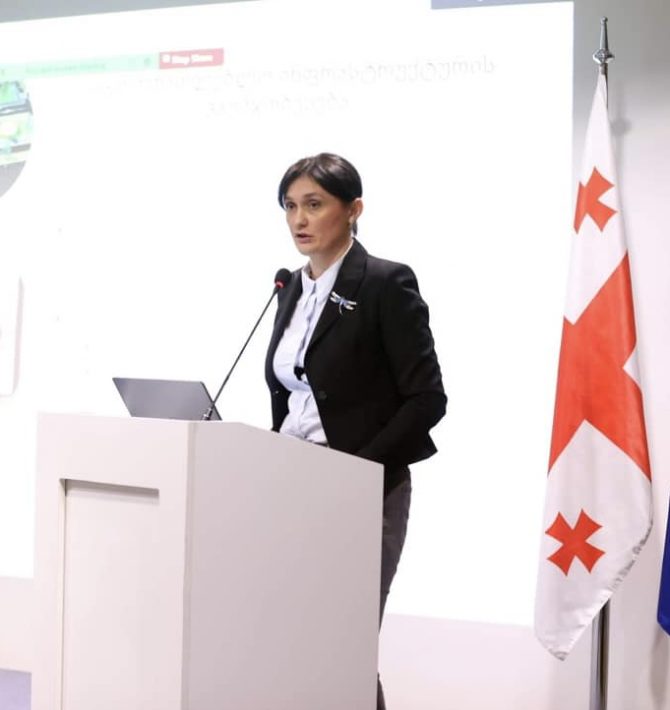I2Q Project GE Component Important Achievements Presented at the International Conference
The head of the I2Q Project general education component, Khatia Tsiramua, spoke at the annual international conference of the National Center of Education Quality Enhancement about the completed and ongoing works. An IBF International Expert in quality assurance and management, Ron Titus, is involved in I2Q Project GE activities. Mr. Titus participated in the international conference and online shared his experience in the quality assurance of schools with stakeholders. He spoke about the Canadian example of continuous professional development in quality assurance.
Ms. Khatia Tsiramua presented interventions implemented supporting the authorization process within the I2Q Project. She mentioned that for professional development and capacity building of the authorization process stakeholders, 150 QA experts have been trained. The orientation meeting has been held for general institution authorization council members. IBF International supervised all the processes. The authorization pilot process was conducted in selected schools. International experts gave the improvement recommendations. Ron Titus supervised the process. He led the process of developing the guide for authorization.
For the quality assurance mechanisms development and increasing the capacity building of school management, piloting of school internal quality assurance mechanisms has been started. More than 80 teachers have passed preparatory training; A new standard for public school principals and an analysis of the school textbooks’ effectiveness have been prepared. Following the school textbooks is planned to prepare an analysis of the electronic learning resources’ effectiveness, as well as to develop four training modules and organize capacity-building activities for the principals of the I2Q Project pilot schools.
Besides, to strengthen the interest of students, especially girls, in teaching STEAM subjects at schools, 80 schools are equipped with the resources necessary for STEAM extracurricular programs. Piloting the programs is scheduled in 120 public schools in addition. 160 teachers have been trained, and training of another group of teachers is lined up. STEAM Extracurricular Programs opened in Tbilisi and Zugdidi Public Schools. Several educational toolkits are available for the students, such as programming, robotics, STEAM, science, wind energy, green energy toolkits, 3D printers, drone, and various computer equipment. Students can create and operate smart devices, present Arduino, renewable energy and robotics corners, and various STEAM extracurricular activities.
Within the framework of the I2Q project, the implementation of relevant activities is designed for the national assessment system development.
With the World Bank’s support, a meaningful project is realized for improving the educational infrastructure. In particular, Infrastructure and Physical Environment Standards of General Educational Institutions were developed. Before the end of the I2Q project, it is scheduled to build 14 new schools according to the abovementioned standards and complete the rehabilitation of 23 schools.
The I2Q project, which is supported by the World Bank, is a support mechanism for education reform. Within the framework of the project, large-scale activities are carried out at various levels of education. The project management unit works closely with all stakeholders.
The general education component of the I2Q project is focused on improving the quality of teaching and learning in general education. The ongoing work within it includes: improving the educational infrastructure in the target schools, supporting the implementation/expansion of programs focused on strengthening the capacities of the whole school, supporting the development of the capacities of teachers and school administration, and promoting the development of the national evaluation system. In this direction, the international consortium works within the framework of the IBF International agreement – “Promoting the improvement of the quality of teaching and learning in general education”.







